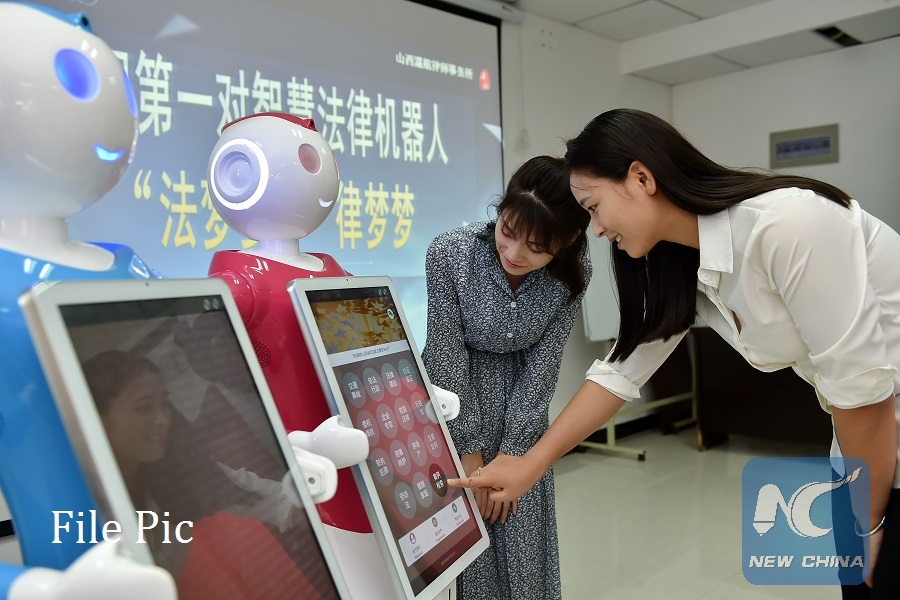
People interact with intelligent robots "Fa Mengmeng" and "Lyu Mengmeng" for legal advice at a law firm in Yuncheng, north China's Shanxi Province, Aug. 29, 2017. (Xinhua/Cao Yang)
LONDON, Sept. 4 (Xinhua) -- Robots should be used to benefit working people, rather than aid employers, a report by Britain's biggest trade union said Monday.
The Trades Union Congress (TUC) said that its report, entitled "Shaping Our Digital Future," explored how the next technological "robot" revolution will impact on jobs and wages.
The TUC report said that the economic gains from digitisation, robotics and artificial intelligence (AI) should be used to benefit working people, for example by reversing policies to raise the state pension age.
"Previous waves of technological change have not led to an overall loss of jobs, but have disrupted the types of job people do," the report said, adding: "With the most recent wave of industrial change, rewards from higher productivity have gone predominantly to business owners, rather than being shared across the workforce through better wages and working conditions."
TUC General Secretary Frances O'Grady said, "Robots are not just terminators. Some of today's jobs will not survive, but new jobs will be created."
"We must make sure that tomorrow's jobs are no worse than today's," the general secretary said. "They must provide fulfilling work, with good pay and conditions. And there must be funding to train people for new work if their job is made obsolete."
In Britain in the 1950s, almost one in three workers worked in manufacturing, while one in 12 worked in professional and technical services.
By 2016, the report said, these shares had reversed. But the jobs lost in manufacturing were not replaced by jobs of similar or better quality in the communities affected. Wages in former industrial areas are still 10 percent below the national average.
The TUC has called on the government, business and trade unions must work together to mitigate disruption to working people's lives, and to maximise opportunities for working people to benefit.
"With two-thirds of the 2030 workforce already in work today, efforts must focus on ensuring that existing workers are equipped to deal with the change," the report said.
"With the UK failing to make productivity gains in the last decade, we need to make the most of the economic opportunities that new technologies are offering. Robots and AI could let us produce more for less, boosting national prosperity," O'Grady added. "But we need a debate about who benefits from this wealth, and how workers get a fair share."
"We should look on the changes ahead as an opportunity to improve the lives of working people and their families. The government could use the revenue generated to reverse policies to raise the state pension age," he said. "And businesses could use productivity gains to improve the pay and conditions of workers."
Alongside the report, the TUC is publishing a companion paper, entitled "Universal basic income and the future of work." The paper, written for the TUC by the Fabian Society, examined the case for a Universal Basic Income, which it says some have argued is a potential response to automation making some jobs obsolete.
That report called for a commission on the future of work to be established on how technology should be introduced, ensuring workers have a say in the introduction of technology at company and sector levels.

